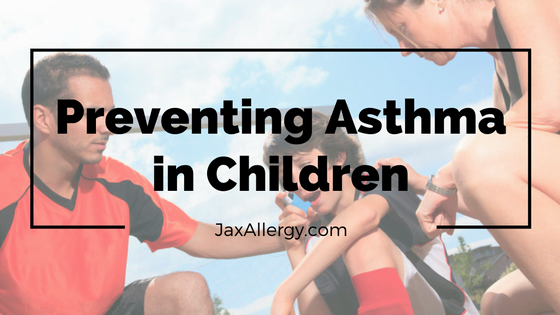Tips for Preventing Asthma in Children

Watching any child suffer from asthma can leave a parent feeling helpless. Thankfully, there are a few things a parent can do to prevent asthma in the first place.
By becoming familiar with the most common asthma triggers, a parent can learn to identify and prevent asthma in their child.
Allergies
Does your child sneeze when he pets a cat? Does she come home with puffy eyes and a slight wheeze every time she returns from her friend’s house? Your child might suffer from allergy induced asthma.
Allergies are a very common trigger for asthma, causing a child to progress from allergy symptoms such as a runny nose, puffy eyes and sneezing, to restricted breathing or even an asthma attack.
Familiarizing yourself with the most common allergies – such as dust, mold, pets, and pollen – and keeping a journal or mental note of when and where your child’s asthma flares up, can help you determine which allergies your child might have. Keep in mind, sometimes a child’s allergic reaction will be strongest immediately upon leaving the environment to which he or she is allergic.
Finding it difficult to figure out what things your child might be allergic to? Allergy testing by a board-certified allergist can immediately identify pertinent allergic triggers.
Once you’ve figured out which allergies your child has, discuss how you can work together to avoid environments that cause allergic reactions.
- If she’s allergic to dogs but loves playing at a friend’s house who has a dog, suggest they play outdoors instead of indoors.
- If you find he has a mold allergy, teach him to identify mold and avoid the places that have it.
- If dust is a problem, buy hypo-allergenic products to make her bedroom(where she spends at least one-third of the day) a healthier place for her.
Avoiding exposure to allergens not only prevents an immediate reaction, it can make a significant difference in your child’s health over the long term as well.
Cigarette Smoke
Even a few seconds of second-hand smoke can be enough to irritate the airways of a child with asthma. Exposure to second-hand smoke during pregnancy has been linked to the development of allergies in children.
If you or your child are exposed to cigarette smoke on a regular basis, consider making changes.
Exercise
Does a short game of tag leave your child coughing or wheezing? They might be suffering from exercise-induced asthma. The majority of those with asthma experience symptoms during exercise.
If you notice your child suffering from asthma after running around the yard or during gym class, discuss with your doctor what you can do to lessen the symptoms when your child is active.
Poor Air Quality
For those who do not suffer from asthma, perhaps the least obvious trigger is the air we breathe: in our homes, at our parks, and in our schools.
According to the American Lung Association, over half of Americans live in areas with unhealthy levels of air pollution. Over time, polluted air irritates the lungs and reduces lung function, making a child with asthma even more prone to attacks.
Though it’s often not possible to move to an area with better air quality, there are things you can do to significantly improve air quality for your child. Install a HEPA air purifier in the bedroom and have an indoor air quality check in your home, also check the local air quality index (AQI) before deciding which days are better suited for outdoor activities and which days might be better spent at home.
If you’re concerned about your child’s asthma, contact us to get started on a prevention plan.
